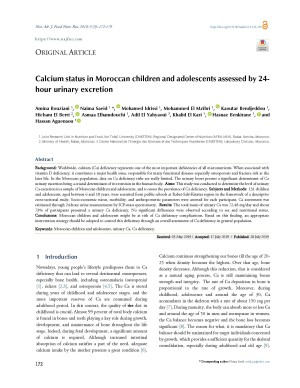Calcium status in Moroccan children and adolescents assessed by 24-hour urinary excretion
Abstract
Background: Worldwide, calcium (Ca) deficiency represents one of the most important deficiencies of all micronutrients. When associated with vitamin D deficiency, it constitutes a major health issue, responsible for many functional diseases especially osteoporosis and fracture risk at the later life. In the Moroccan population, data on Ca deficiency risks are really limited. The urinary losses present a significant determinant of Ca urinary excretion being a crucial determinant of its retention in the human body. Aims: This study was conducted to determine the level of urinary Ca excretion in a sample of Moroccan children and adolescents, and to assess the prevalence of Ca deficiency. Methods and Material: 131 children and adolescents, aged between 6 and 18 years, were recruited from public schools at Rabat-Salé-Kénitra region in the framework of a descriptive cross-sectional study. Socio-economic status, morbidity, and anthropometric parameters were assessed for each participant. Ca assessment was estimated through 24-hour urine measurements by ICP-mass spectrometry. Results: The total mean of urinary Ca was 72.48 mg/day and about 73% of participants presented a urinary Ca deficiency. No significant differences were observed according to sex and nutritional status. Conclusions: Moroccan children and adolescents might be at risk of Ca deficiency complications. Based on this finding, an appropriate intervention strategy should be adopted to control this deficiency through an overall assessment of Ca deficiency in general population.
Full text article
Authors
Copyright (c) 2019 Authors

This work is licensed under a Creative Commons Attribution 4.0 International License.
-
Attribution — You must give appropriate credit, provide a link to the license, and indicate if changes were made. You may do so in any reasonable manner, but not in any way that suggests the licensor endorses you or your use.
-
No additional restrictions — You may not apply legal terms or technological measures that legally restrict others from doing anything the license permits.





